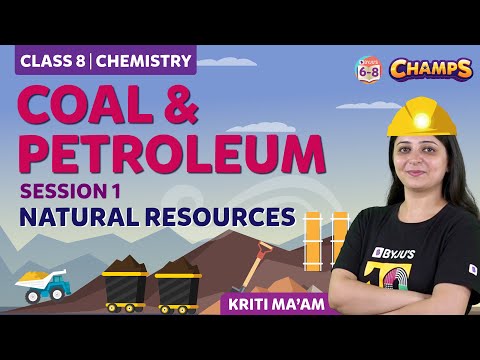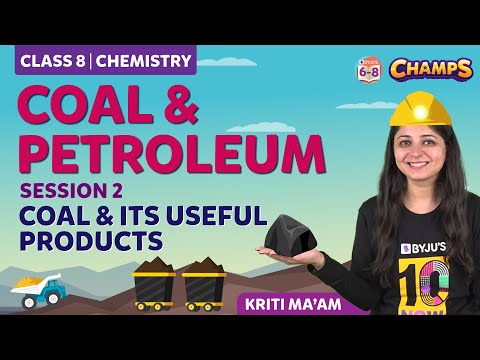Class 8 chemistry MCQs with answers are provided here for Chapter 5, Coal and Petroleum. These MCQs are based on the CBSE board curriculum and correspond to the most recent Class 8 chemistry syllabus. By practising these Class 8 multiple choice questions, students will be able to quickly review all of the ideas covered in the chapter and prepare for the Class 8 annual examinations as well as other competitive exams.
Download Chapter 5 Coal and Petroleum MCQs PDF by clicking on the button below.
Download PDF
Recommended Videos
Coal and Petroleum – Natural Resources

Coal and its Useful Products

Class 8 Coal and Petroleum MCQs
1. What is the primary source of minerals in the soil?
a) Plants
b) Animals
c) Parent rock
d) All of the above
Answer: c
Explanation: Soil is formed from the parent rocks. The disintegration of rocks and weathering typically lead to soil formation. Thus, the parent rock is considered the primary source of minerals in the soil.
2. Which of the following is not a petroleum product?
a) Kerosene
b) Beeswax
c) Pitch black
d) None of the above
Answer: b
Explanation: Kerosene, pitch black and gasoline are formed as a byproduct during petroleum refining. In contrast, beeswax is a natural source of wax created by honey bees.
3. Which of the following is the purest form of carbon?
a) Coal gas
b) Coal tar
c) Coke
d) None of the above
Answer: c
Explanation: Coke is the purest form of carbon, typically produced from coal. It is the solid carbonaceous material emanated from the destructive distillation of low-sulphur, low-ash bituminous coal. In contrast, coal gas and coal tar contain less carbon content and more impurities.
4. Which of the following are vital constituents of petroleum?
a) Butane
b) Liquified petroleum gas
c) Jet fuel
d) All of the above
Answer: d
Explanation: Butane, liquified petroleum gas, jet fuel, petrol, fuel oil, kerosene and diesel are vital components of petroleum.
5. Which of the following is used as an industrial fuel?
a) Coal gas
b) Nitrogen gas
c) Carbon dioxide gas
d) All of the above
Answer: a
Explanation: Coal gas is produced during coal processing to obtain coke. It is used as fuel in industries and therefore is referred to as an industrial fuel.
6. Which of the following is used to manufacture steel?
a) Coke
b) Coal gas
c) Coal tar
d) All of the above
Answer: a
Explanation: Coke is used to simulate steel and extract numerous metals.
7. Which of the following petroleum content boils at temperatures greater than 350o C?
a) Diesel oil
b) Petroleum gas
c) Lubricating oil
d) All of the above
Answer: c
Explanation: Lubricating oil boils at temperatures greater than 350o C.
8. Which of the following petroleum product is used as a solvent for dry cleaning clothes?
a) Petrol
b) Liquified petroleum gas
c) Lubricating oil
d) All of the above
Answer: a
9. Petroleum is a _______ solution.
a) Liquid-liquid
b) Gas-gas
c) Liquid-gas
d) All of the above
Answer: a
10. What is the source of coal formation?
a) Plants
b) Animals
c) Both plants and animals
d) None of the above
Answer: a
Explanation: Plants are the source of coal formation. It is formed by decomposing large amounts of trees under the soil for about 300 million years.
11. Which of the following is the characteristic of exhaustible natural resources?
a) They are unlimited
b) They are limited
c) They are not dependent on nature
d) All of the above
Answer: b
Explanation: Exhaustible natural resources are present in limited quantity and can be exhausted by human activities. Natural gas, petroleum, coal, minerals, animals, plants, etc., are some exhaustible natural resources.
12. Which of the following are examples of exhaustible natural resources?
a) Water and sunlight
b) Wildlife and minerals
c) Coal and sunlight
d) All of the above
Answer: b
Explanation: Wildlife and minerals are examples of exhaustible natural resources. It is present in limited quantity and can be exhausted by human activities.
13. What is the primary element of liquified petroleum gas and compressed natural gas?
a) Butane and hexane
b) Methane and hexane
c) Methane and butane
d) All of the above
Answer: c
14. Which of the following is not a natural resource?
a) Sunlight
b) Water
c) Plastic
d) None of the above
Answer: c
Explanation: Sunlight and water are natural resources. In contrast, plastic is an artificial substance synthesised in industries. Thus, it is not regarded as a natural resource.
15. ________ is a thick black liquid with an unpleasant odour.
a) Coal tar
b) Gasoline
c) Diesel oil
d) All of the above
Answer: a
Explanation: Coal tar is a thick black liquid with an unpleasant odour. It is produced during coal processing in industries.
16. LPG is the abbreviation of ________.
a) Liquified petroleum gas
b) Low petroleum gas
c) Liquid pressure gas
d) None of the above
Answer: a
Explanation: LPG is the abbreviation of liquified petroleum gas.
17. CNG is the abbreviation of ________.
a) Compressed natural gas
b) Compress natural gas
c) Compress national gas
d) None of the above
Answer: a
Explanation: CNG is the abbreviation of compressed natural gas.
18. Choose the correct statement.
a) Density of coal is less than coke
b) Density of coal is more than coke
c) Density of coal is equal to coke
d) None of the above
Answer: b
19. Which of the following is not a free state of carbon?
a) Petrol
b) Coke
c) Diamond
d) All of the above
Answer: a
Explanation: Coke and diamond are free states of carbon. In contrast, petrol is a mixture of methane and butane.
20. What is the common name of petroleum?
a) Blue gold
b) Yellow gold
c) Black gold
d) None of the above
Answer: c
Explanation: Black gold is the common name for petroleum as it is a vital energy source, and its byproducts are valuable too. Further, crude petroleum glimpses black in colour. Therefore, it is known as black gold.
Read Also:
- Formation of Coal
- The Story of Coal
- Coal Gas – Coke & Coal Tar
- The Effect of Burning Fossil Fuels on the Environment
- Chemistry Worksheets Class 8 on Chapter 5 Coal and Petroleum with Answers – Set 1
- Chemistry Worksheets Class 8 on Chapter 5 Coal and Petroleum with Answers – Set 2
- Chemistry Worksheets Class 8 on Chapter 5 Coal and Petroleum with Answers – Set 3
- Class 8 Chemistry Chapter 5 – Coal and Petroleum Important Questions with Answers
- Chemistry Concept Questions and Answers
Recommended Videos
Effects of Burning Fuels on The Environment

History of Fuel

How Are Fossil Fuels Formed?

Coal and Petroleum – MCQs
